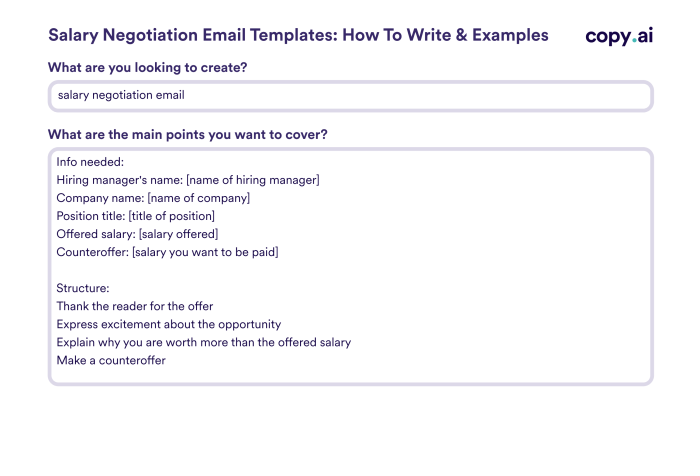Negotiating salary for a new job takes center stage, this opening passage beckons readers with idntimes author style into a world crafted with good knowledge, ensuring a reading experience that is both absorbing and distinctly original.
When embarking on a new job opportunity, understanding how to negotiate your salary effectively can make a significant impact on your future earnings. From researching salary expectations to handling counteroffers, mastering negotiation strategies is key to securing a favorable compensation package.
Researching salary expectations

Researching salary expectations is crucial when negotiating for a new job as it helps you understand the market value of your skills and experience, ensuring you are fairly compensated for your work.
You also will receive the benefits of visiting Job openings in renewable energy sector today.
Importance of Research
- Researching salary ranges for the specific job and location can provide insight into what other professionals in your field are earning, helping you set realistic expectations for your own salary negotiation.
- It allows you to make informed decisions about whether the offer you receive is competitive and aligns with industry standards.
- By understanding salary expectations, you can advocate for yourself confidently during negotiations and increase your chances of securing a fair compensation package.
Available Resources
- Online salary research tools such as Glassdoor, PayScale, and LinkedIn Salary can provide valuable information on average salaries for different industries, job titles, and locations.
- Professional organizations and industry reports often publish salary surveys that offer insights into compensation trends and benchmarks for specific roles.
- Networking with peers in your field can also provide valuable firsthand information on salary ranges and negotiation strategies.
Factors Impacting Salary Negotiations
- Experience: The more experience you have in a particular role, the higher your earning potential may be. Highlighting your relevant experience during negotiations can justify a higher salary.
- Education: Advanced degrees or certifications can command higher salaries in certain industries. Make sure to factor in your educational background when assessing salary expectations.
- Skills: Specialized skills or certifications that are in high demand can give you leverage in negotiating a higher salary. Demonstrating the value of your skills to the employer can strengthen your position in salary discussions.
Strategies for negotiating a higher salary
When it comes to negotiating a higher salary for a new job, it’s essential to be prepared and strategic in your approach. Highlighting your accomplishments and skills, understanding the company’s budget constraints, and confidently discussing salary expectations are crucial aspects of the negotiation process.
Highlighting Accomplishments and Skills
During the negotiation process, make sure to showcase your accomplishments and skills that are directly relevant to the position you are applying for. Provide specific examples of how your past experiences have prepared you for the role and how you can contribute to the company’s success.
Understanding Company’s Budget Constraints, Negotiating salary for a new job
It’s important to have a clear understanding of the company’s financial situation and budget constraints before discussing salary expectations. This will help you tailor your negotiation strategy accordingly and demonstrate that you are aware of the organization’s limitations.
Confidently Discussing Salary Expectations
When discussing salary expectations, be confident in expressing the value you bring to the table and justifying the desired increase. Provide data or examples of how your skills and experience align with the market rate for similar positions. It’s essential to be assertive but also open to negotiation to reach a mutually beneficial agreement.
Handling counteroffers and additional benefits: Negotiating Salary For A New Job

When negotiating a salary for a new job, it is common to receive counteroffers from employers. Evaluating these counteroffers effectively and deciding on the best course of action is crucial to ensure a successful negotiation process. Additionally, considering non-monetary benefits like flexible work hours or professional development opportunities can also play a significant role in reaching a mutually beneficial agreement with the employer.
Evaluating Counteroffers
- Consider the overall compensation package, including base salary, bonuses, benefits, and any additional perks offered by the employer.
- Assess the value of the counteroffer in comparison to industry standards and your own worth based on skills, experience, and qualifications.
- Take into account the long-term implications of accepting or rejecting the counteroffer and how it aligns with your career goals.
Non-Monetary Benefits
- Flexible work hours can provide a better work-life balance and increased job satisfaction.
- Professional development opportunities such as training programs, certifications, or mentorship can enhance your skills and advance your career.
- Health and wellness benefits, retirement plans, and other perks can also contribute to your overall satisfaction with the job.
Negotiation Tactics
- Clearly communicate your value to the employer and justify your salary expectations based on market research and your contributions to the company.
- Show willingness to compromise and find common ground to reach a mutually beneficial agreement.
- Remain professional and respectful throughout the negotiation process to build a positive relationship with the employer.